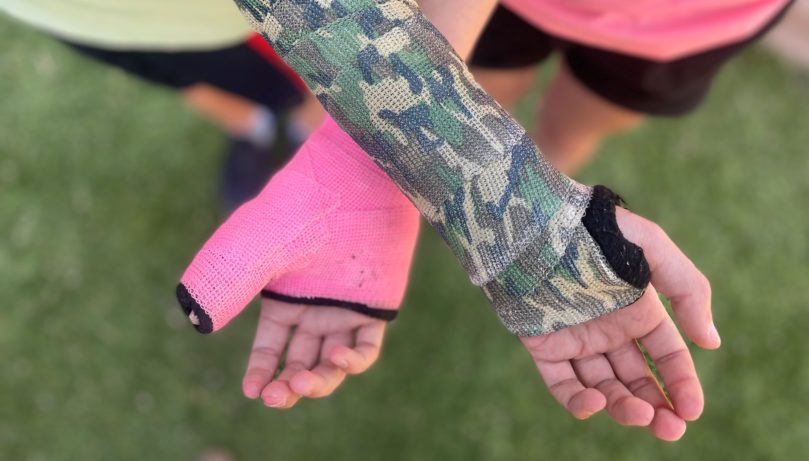As my son settled into place at the piano, I spoke with his piano teacher –
“The doctor said he is fine to play if he is comfortable playing.”
Without hesitation he began. He moved his shoulder to compensate for his inability to move his wrist. His fingers peaking out from a cast that ran from his knuckles to his elbow.
His piano teacher smiled and through laughter declared –
“Your kids are so resilient!”
No doubt because she had also seen my son play through a scorpion sting to the finger and the litany of injuries shared amongst my three children.
My response was a little less enthusiastic –
“They are, but I would rather not know that!”
It’s a phrase I have been hearing a lot lately – Resilient. Kids are resilient. Your child is resilient.
As parents we want our kids to be resilient, while simultaneously wanting to protect them from any and every hardship that can produce it.
We don’t want our kids to:
- Get injured
- Fail
- Get cut from the team
- Be bullied
- Have friends give them the cold shoulder
- Have people not respect their boundaries
We want our kids to be healthy. Safe. Happy. Successful in all their endeavors.
But, it’s the difficulties and adversity they, and we, face that teach us the life skill of resilience. Resilience is a necessary life skill that like any muscle, needs to be developed through repetition and practice.
We get a glimpse of the journey toward resilience in the Bible:
“…we rejoice in our sufferings, knowing that suffering produces endurance, and endurance produces character, and character produces hope, and hope does not put us to shame, because God’s love has been poured into our hearts through the Holy Spirit who has been given to us.”
Romans 5:3-5 ESV
Suffering reveals our true character and as we persevere we learn endurance. As we endure we learn that even in difficult circumstances we can be hopeful. This is resilience – being able to see beyond our present circumstances, knowing they can’t limit us, define us, or cause us to lose hope.
We don’t learn resilience when everything is perfect. We learn it when we have to adapt and make the most of our less than ideal circumstances.
And it’s a lesson we each have to learn for ourselves. Resiliency can’t be caught or taught. We learn resilience by doing.
Resilience is born of suffering. The setbacks, suffering, adversity, and resistance is how our kids learn resilience. Their growing bodies and minds allow them to more easily pivot and adapt.
Typically, children don’t associate setbacks with a loss of hope. They accept their situation as temporary and move on -and they don’t let it prevent them from doing what they love.
Case in point, think of the last time our kids were sick. If your kids are like mine, getting them to rest is nearly impossible. My kids are still antsy to play and move even when sick.
Kids are determined to accomplish as much as possible despite limitations. Hence my son’s determination to play the piano while in the confines of a cast or post scorpion sting.
Resilience is a good and necessary life skill, not just for us, but for our children as well. Whatever our kids or we are facing today, the ability to bounce back and exhibit toughness are admirable qualities. We don’t discover we are resilient without opposition or setbacks.
Together may we see setbacks as opportunities to flex our resilience muscles for not just ourselves, but our children too. May we not shelter our kids from difficulty so they can learn this valuable life skill. And may we all discover how truly resilient we are!
